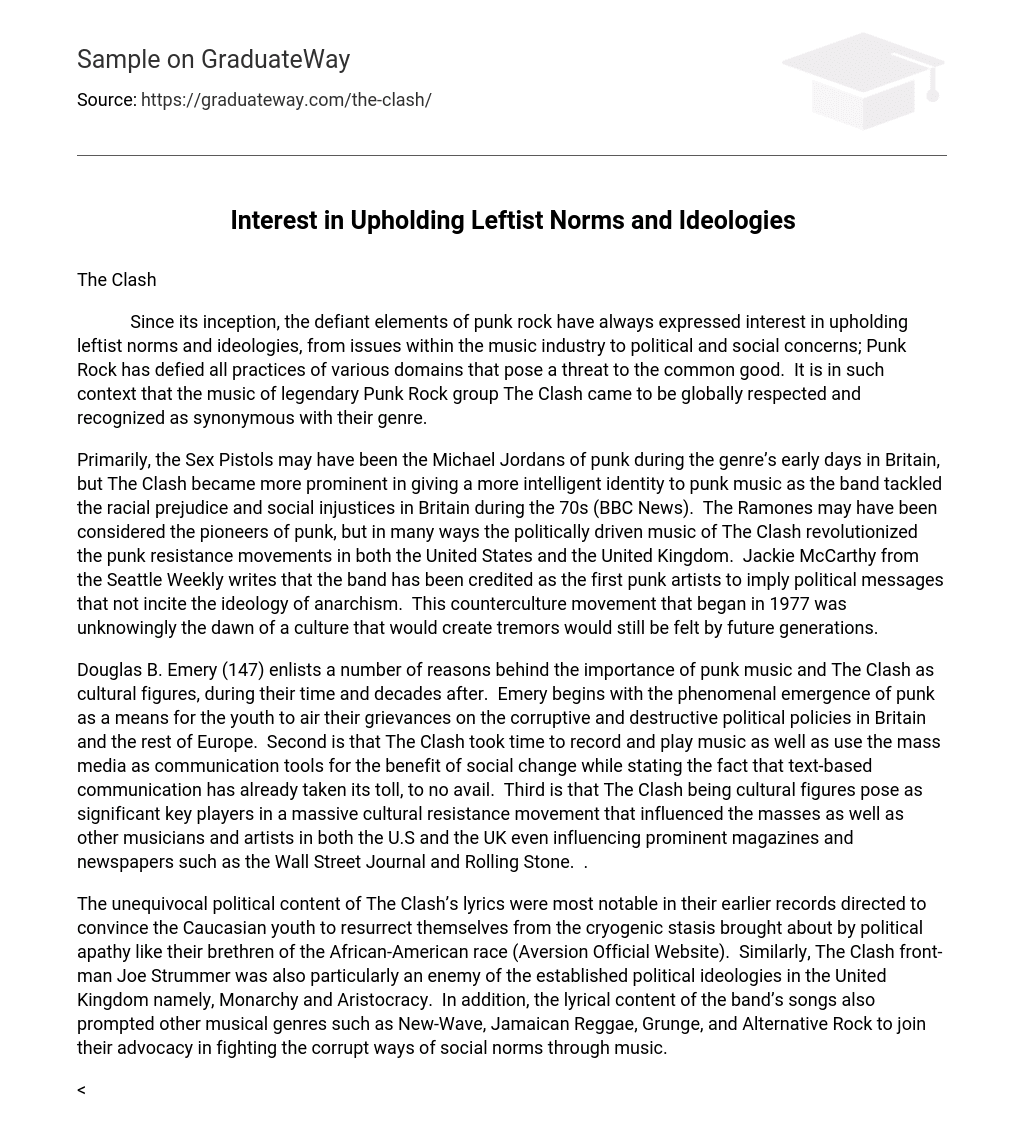Since its inception, the defiant elements of punk rock have always expressed interest in upholding leftist norms and ideologies, from issues within the music industry to political and social concerns; Punk Rock has defied all practices of various domains that pose a threat to the common good. It is in such context that the music of legendary Punk Rock group The Clash came to be globally respected and recognized as synonymous with their genre.
Primarily, the Sex Pistols may have been the Michael Jordans of punk during the genre’s early days in Britain, but The Clash became more prominent in giving a more intelligent identity to punk music as the band tackled the racial prejudice and social injustices in Britain during the 70s (BBC News). The Ramones may have been considered the pioneers of punk, but in many ways the politically driven music of The Clash revolutionized the punk resistance movements in both the United States and the United Kingdom. Jackie McCarthy from the Seattle Weekly writes that the band has been credited as the first punk artists to imply political messages that not incite the ideology of anarchism. This counterculture movement that began in 1977 was unknowingly the dawn of a culture that would create tremors would still be felt by future generations.
Douglas B. Emeryenlists a number of reasons behind the importance of punk music and The Clash as cultural figures, during their time and decades after. Emery begins with the phenomenal emergence of punk as a means for the youth to air their grievances on the corruptive and destructive political policies in Britain and the rest of Europe. Second is that The Clash took time to record and play music as well as use the mass media as communication tools for the benefit of social change while stating the fact that text-based communication has already taken its toll, to no avail. Third is that The Clash being cultural figures pose as significant key players in a massive cultural resistance movement that influenced the masses as well as other musicians and artists in both the U.S and the UK even influencing prominent magazines and newspapers such as the Wall Street Journal and Rolling Stone. .
The unequivocal political content of The Clash’s lyrics were most notable in their earlier records directed to convince the Caucasian youth to resurrect themselves from the cryogenic stasis brought about by political apathy like their brethren of the African-American race (Aversion Official Website). Similarly, The Clash front-man Joe Strummer was also particularly an enemy of the established political ideologies in the United Kingdom namely, Monarchy and Aristocracy. In addition, the lyrical content of the band’s songs also prompted other musical genres such as New-Wave, Jamaican Reggae, Grunge, and Alternative Rock to join their advocacy in fighting the corrupt ways of social norms through music.
London calling to the faraway towns, now war is declared – and battle come down. London calling to the Underworld come out of the cupboard, you boys and girls. London calling, now don’t look to us, phoney Beatlemania has bitten the dust, London calling, see we ain’t got no swing ‘Cept for the ring of that truncheon thing. These words comprise the first verse of The Clash’s song London Calling. The lines reflect how the band’s lyrics protest against the music industry’s established profit system, suggesting that music is not an object of capitalist corruption but a means of communication to tell the world of what is really going on.
Upon the release of the band’s self-titled major label debut, the band immediately gave birth to punk and tore through the very core of the British youth culture and made its way through the conscience of the American youth in the subsequent decade. The album also confirmed the notion that the band officially uttered the very first punk statement.
Myron Joel Aronoff cites Peter Marsh’s Dole Queue Rock’s implication that aboriginal emergence of the Punk movement was brought about by the socio-economic conditions of poverty-stricken working class youth and that an individual cannot play “dole queue rock while savouring the luxury of having three meals a day (qtd. in Marsh 114). Aronoff furthers that the band’s comprehensive perspective of the world as heard in their lyrics was manufactured by their experiences in their place of origin as well as the members’ exposure to radical art.
Conversely, like other cultural weapons that assault the social authorities, punk has been challenged by certain individuals who deem new cultures as a resurgence of previous ones. Richard Kadrey and Larry McCaffery, for instance suggests that the British punk movement was copied from its American counterpart, but Roger Sabin authenticates that The Clash and the British Punk Movement have serious universal advocacies directed for social change, not just in Britain or Europe, but to the rest of the world as well. By scrutinizing the link between cyberpunk’s literary elements and punk lyrical poetry, Sabin suggests that American punk was more focused on the aesthetics of punk music while the British were more universal because of their focus on social and political issues.
The Clash like their colleagues in the Punk music scene have become influential artists for both musicians and non-musicians alike. Unlike their predecessors from the Rock and Roll counterculture, The Clash not only set their music to angst driven teenagers, but to people, in general, people who should care for this world like the band does.
Works Cited
Emery, Douglas, B. “Popular Music of The Clash: A Radical Challenge to Authority.” The Frailty of Authority. Ed. Myron Joel Aronoff. Piscataway, NJ: Transaction Publishers, 1986. 149
Hall, Michael, K. Crossroads: American Popular Culture and the Vietnam Generation. Lanham, MD: Rowman & Littlefield, 2005.
Sabin, Roger. Punk Rock: The Cultural Legacy of Punk. New York: Routledge, 1999.
“Strummer’s lasting culture Clash.” 23 December 2002. The British Broadcasting Corporation. 14 October 2008 < http://news.bbc.co.uk/1/low/entertainment/music/2600955.stm>.
“The Clash.” 14 October 2008. Aversion: Rock, Punk, Indie. 14 October 2008 http://www.aversion.com/bands/histories.cfm?directory=clash.
.





